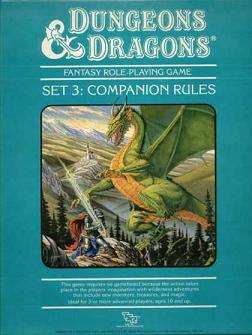Retrospective: Dungeons & Dragons Companion Rules
 The first time I ever read the words "D&D Companion supplement" – or, more accurately "D&D® Companion supplement" – was in the pages of the 1981 D&D Expert Rulebook, which explained that it would "detail levels up to 36 in more detail." [sic] That version of the D&D Companion never appeared. Instead, just a couple of years later, TSR released yet another version of the D&D Basic Rules. A new Expert Rules followed soon thereafter and then, a year later (1984), a box set finally appeared bearing the title, Companion Rules.
The first time I ever read the words "D&D Companion supplement" – or, more accurately "D&D® Companion supplement" – was in the pages of the 1981 D&D Expert Rulebook, which explained that it would "detail levels up to 36 in more detail." [sic] That version of the D&D Companion never appeared. Instead, just a couple of years later, TSR released yet another version of the D&D Basic Rules. A new Expert Rules followed soon thereafter and then, a year later (1984), a box set finally appeared bearing the title, Companion Rules.Consisting of two rulebooks, one for players and one for the Dungeon Master, the Companion Rules was the third set in Frank Mentzer grand revision of Dungeons & Dragons, with the goal of making it more accessible to a new generation of players. From what I have gathered, it was quite successful in this goal, selling more copies than any previous version of D&D (how it compared to AD&D sales, I'm not certain).
Unlike what had been stated in David Cook's Expert Rulebook, Mentzer's Companion only covered levels 15–25, leaving levels 26–36 to the later D&D Master Rules. If this irked me at the time, I can't really recall. What I do know is that I was very grateful to see any extended treatment of the levels above 12 or so covered in an official D&D product, even if it was part of the "kiddie D&D" line. I'd long been fascinated by the idea of very high-level play, even though only one character had ever managed to reach such lofty heights. Consequently, I greeted the publication of the Companion Rules with some excitement. I snatched up a copy while I was on vacation with my family in North Carolina and spent many an hour poring over its pages.
The 32-page Players Companion book interested me primarily for its inclusion of its prestige classes avant la lettre. Neutral clerics of 9th level or above could, for example, opt to become druids, while Lawful fighters who eschewed domain rulership could become paladins. This was a very strange concept to me at the time, since I already knew druids and paladins as classes in AD&D that a player could choose at 1st level. Likewise, the D&D line had until this point kept to the formula of only four human and three demihuman classes without exception. Mentzer was now tinkering with this formula in a way that felt simultaneously innovative and transgressive. I wasn't completely sure I liked it, but it certainly had caught my attention.
The 64-page Dungeon Masters Companion had a lot more that I liked unreservedly, in part because I felt then, as I do now, that it had finally made good on the promise of D&D's post-adventuring endgame, something that even AD&D had never really done. Thus, Mentzer provided rules for administering a dominion and handling large scale combat without recourse to miniatures battles, two things I felt missing in previous versions of the game. Likewise, he began to touch on the matter of planar adventures, though not nearly as much as I would have liked. On the other hand, he did greatly expand the variety – and power – of monsters and magic items, both of which I consider absolutely necessary to the success of a high-level campaign.
Taken together, the two books of the Companion Rules are creditable first steps toward showing in practical terms what it might be like to run a Dungeons & Dragons campaign at very high levels, which is why I have always had a fondness for it. Its reach exceeds its grasp, of course, but I don't see that as a grave defect. If anything, it's strangely inspiring, since Mentzer has already laid a foundation on which an enterprising DM can build. For example, I found the domain management system as presented too limited for my own purposes, so I expanded upon it until I felt it sufficient for what I wanted to do. To my mind, that's what all the best RPG products should do: encourage players and referees to exercise their own creativity. Judged on this basis, the D&D Companion Rules is perhaps the best thing Frank Mentzer ever wrote.
James Maliszewski's Blog
- James Maliszewski's profile
- 3 followers



